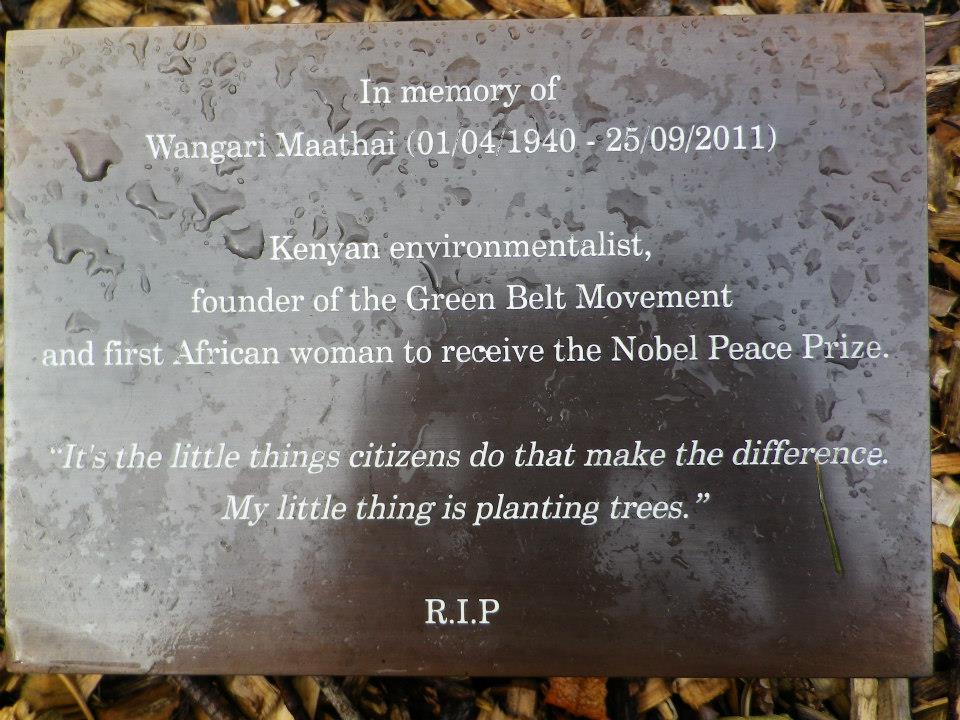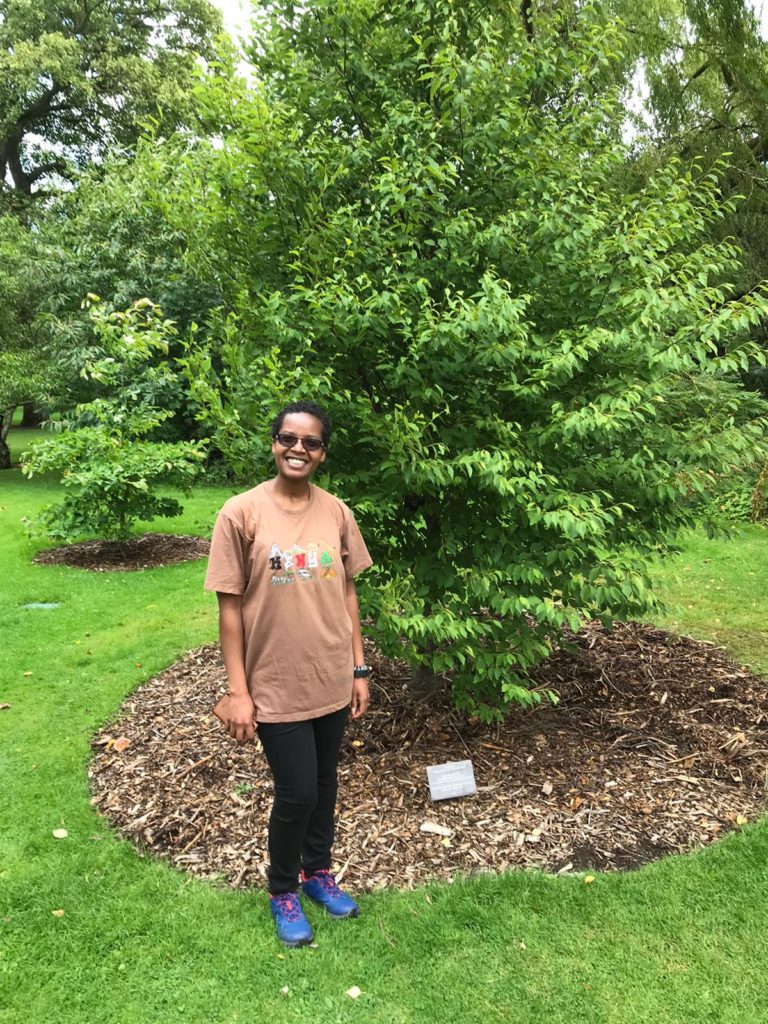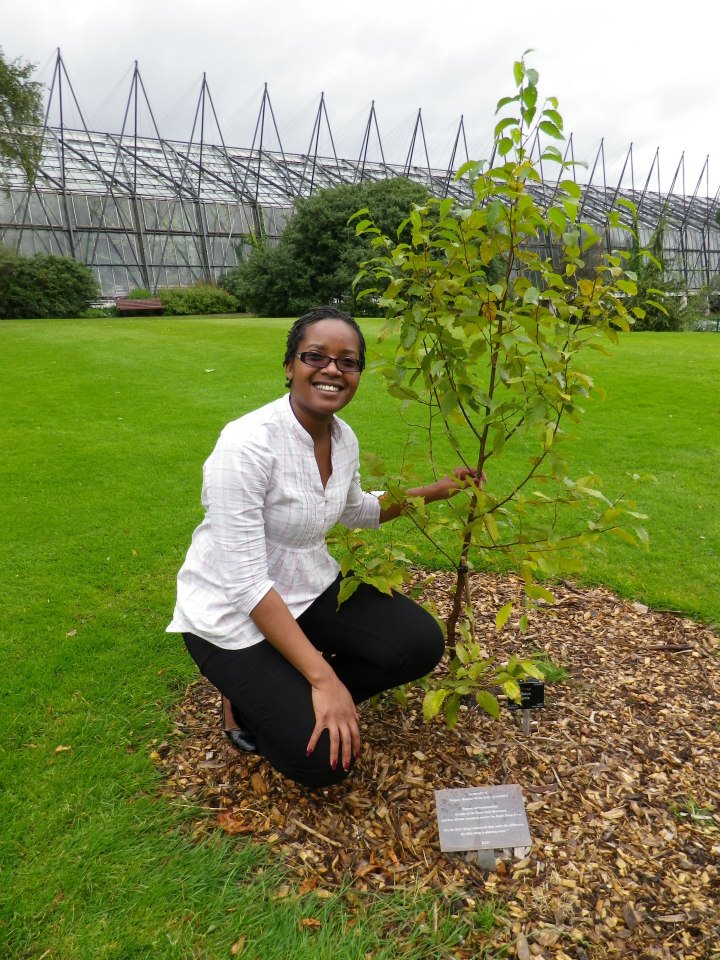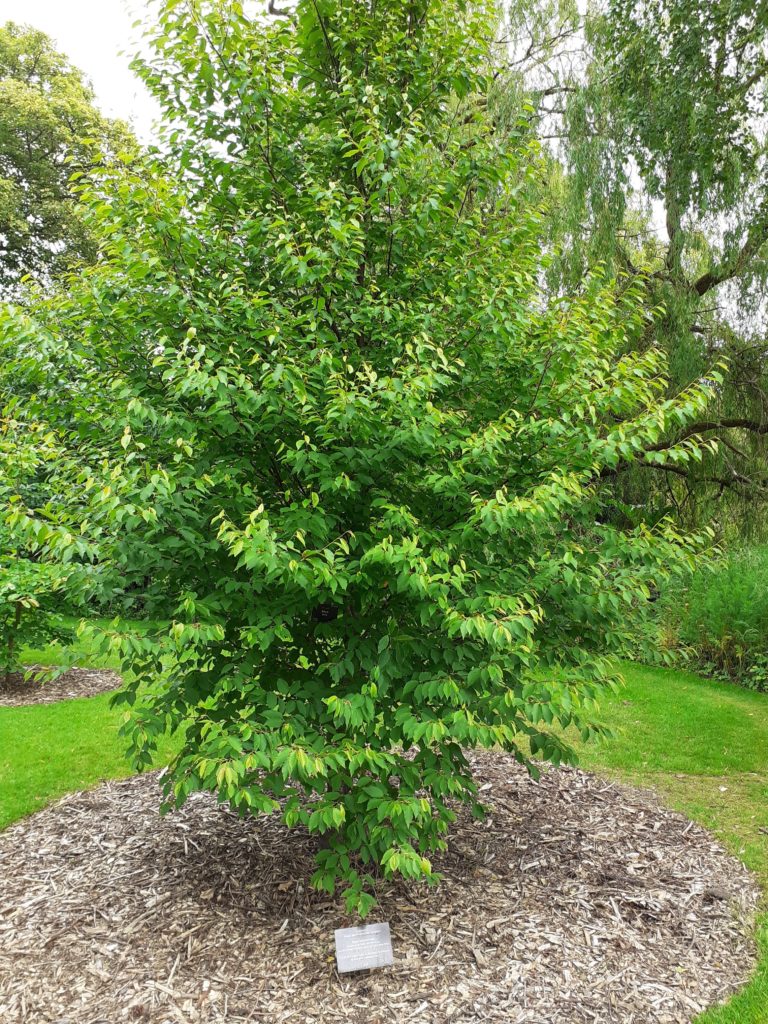This wonderful article has been written by Garden Guides, Helen Mitchell and Irene Paterson. For the duration of the Covid guided tours at Edinburgh have been temporarily suspended. The garden guides remain busy researching the stories behind the plants and Garden.

Wangari Maathai was born in 1940 in rural Kenya when Kenya was a colony of the British Empire. She had a traditional village upbringing and describes her pleasure as a child in collecting water and spending time by a running stream flowing through a verdant forest near her home. In particular she recalls her delight in finding tadpoles in the water. (A childhood memory I share.) At the end of her Nobel Acceptance Speech she recalls this memory and wishes “Of wanting a world where all children can experience the delight of finding tadpoles in pools by a clear running stream” Editor’s Note: It was not intentional but is very appropriate that the tree has now been moved closer to the pond and, the tadpoles in the spring.
By the time Wangari was an adult, much of the forest of her childhood had been cleared for logging and then farming. The local women could no longer live in their traditional way as firewood for cooking disappeared and the land for traditional sustainable farming became reduced and degraded.
A trailblazer throughout her life, Wangari used her skill and determination to redress the wrongs she saw around her. In the 1970s she was the first woman in East and Central Africa to earn a doctorate degree, to become an associate professor and chair a university department. In 1977 she founded the Green Belt Movement, a grassroots organization which encouraged rural women to set up tree nurseries to grow trees for sale and subsequent re-planting to reduce poverty and restore Africa’s forests. The money raised gave the women some financial independence and a sense of control over their lives. Professor Maathai saw that behind the everyday hardships of the poor were deeper issues of disempowerment. She spoke on behalf of women’s rights, seeking more accountability from national leaders and fighting against land grabbing and the encroachment of agriculture into the forests.
In 2004 Wangari Maathai was the first African woman to receive the Nobel Peace Prize for her contribution to sustainable development, democracy and peace. The citation said ” Peace on earth depends on our ability to secure our living environment. Maathai stands at the fore front of the fight to promote ecologically viable social, economic and cultural development in Kenya and in Africa. She has taken a holistic approach to sustainable development that embraced democracy, human rights and women’s rights in particular. She thinks globally and acts locally”

The explanation for why there is a tree in Wangari’s memory in the RBGE, involves another Kenyan woman, Mary Njoki. Mary came to Edinburgh to study and work as a social worker. She still lives in Scotland. She describes as a teenager at school in Kenya being very inspired by the achievement of Wangari which led her to be involved in environmental initiatives. Hearing of the death of Wangari after she had come to Scotland, she felt compelled to do something to commemorate her and to bring the story of her life and achievements to the attention of people here. She approached and persuaded the council to plant 50 trees in the Figgate park in Edinburgh. The tree planting was a community event involving 60 people from all walks of life wanting, not just to commemorate Wangari but also to reflect on her achievements and their significance as they planted the trees in her memory. However, wanting a more visible and permanent memory of Wangari she raised the money to have the tree planted at the RBGE. The RBGE has now adopted the tree. Next year is the 10th anniversary of Wangari’s death and Mary is campaigning for more trees to be planted in honour of her anniversary.


The mission statement of the RBGE is to explore, conserve and explain the world of plants for a better future. For the RBGE this involves conservation and restoration of habitats in the fight against loss of biodiversity, education and outreach, both local and international and finally research. In a future increasingly uncertain in the face of climate change it is fitting to have a tree to commemorate this Wangari Maathai who did so much to restore, conserve and campaign for the forest environment for the benefit of local people and their way of life in Kenya and across Africa. Everywhere the natural world is being depleted and habitats lost, Wangari’s life and actions are an inspiration to us all.
We are grateful to Mary Njoki for bringing Wangari’s story to our attention.
Further links:
https://en.wikipedia.org/wiki/Wangari_Maathai
http://www.greenbeltmovement.org/who-we-are/our-history
On the greenbelt website there are further links including a link to a you tube film that I would highly recommend.
Helen Mitchell and Irene Paterson
